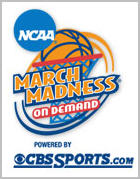-
Why March Madness on Demand is Such a Winner
The first round games of the NCAA's March Madness are a week from today and the hype surrounding the tournament is in full swing. But the tournament itself is no longer the only story; the broadband-delivered "March Madness on Demand" has become a big part of the 3 week experience as well. Since converting from a subscription service to a free, ad-supported format 4 years ago, CBS Sports and the NCAA have made MMOD a huge winner, providing plenty of lessons for others. These include:
1. Under the right circumstances, free with ads beats paid with subscriptions. It was big news back in '06 when CBS converted MMOD from subscription access to free, ad-supported. In retrospect, it looks like a stroke of genius. The $30M in ad revenue MMOD will generate for CBS this year would have required 1.5
 million of the old $20 subscriptions. Hitting that subscription number would have been miraculous. With the free model, instead of allocating scarce marketing dollars and resources on acquiring temporary subs, CBS can focus on promoting the games, selling ads and striking high-quality distribution deals - 3 things that networks do very well. Free vs. paid will be a perpetual debate for premium video, but solid market research, well-thought out business cases and a willingness to experiment can lead to big payoffs, as MMOD has shown.
million of the old $20 subscriptions. Hitting that subscription number would have been miraculous. With the free model, instead of allocating scarce marketing dollars and resources on acquiring temporary subs, CBS can focus on promoting the games, selling ads and striking high-quality distribution deals - 3 things that networks do very well. Free vs. paid will be a perpetual debate for premium video, but solid market research, well-thought out business cases and a willingness to experiment can lead to big payoffs, as MMOD has shown.2. Well-executed online access burnishes the brand. Following the above, MMOD is a huge win for the CBS brand and for the NCAA. Fans love MMOD and appreciate the easy online access. Of course, anything for free is always well-received, especially in a down economy. Large audiences mean lots of cross-promotional opportunities for other CBS programs. Abundant media coverage means the brand gets tons of free promotion. And the list goes on.
3. Advertisers love being a part of engaging, high-quality online experiences. The increase in MMOD ad revenue from $4M in '06 to $30M this year speaks to advertisers' interest. It's no surprise that big brands are increasingly challenged to access large target audiences and have their messages heard (that's why the Super Bowl maintains its massive appeal). MMOD offers an exciting, immersive and interactive avenue to augment brands' on-air tournament spending. MMOD gives CBS ad sales teams a formidable differentiator. As AdAge notes, that helped CBS retain wounded GM as an advertiser, while the company dropped the Super Bowl and the Academy Awards from its media plan.
4. User experience matters, a lot. MMOD is a hugely complex undertaking for CBS, but delivering a positive experience that lives up to the hype is ultimately what matters. In the past, not knowing how many simultaneous users to expect or what bandwidth would be required, CBS cautiously proceeded with its so-called "waiting room" model. That's now been eliminated, and everyone can watch on-demand. This year CBS is also offering a high quality or "HQ" option, powered by Silverlight. Overall, CBS's player is clean and easy to use. My experience in the past has been that the ads are obvious, but not overwhelming. All of this registers with users and contributes to a positive experience.
5. The side dishes complement the main meal. There's no question that the games themselves are the primary attraction. But CBS has been clever in augmenting the games with lots of other stuff that contribute to the overall experience. For example, if you go to the site now, you can see highlights of past championship games. Then on Sunday will come the selection show. There's a Facebook integration, widgets and the "Selection Sunday Challenge." And this year CBS is also introducing mobile access, albeit for a fee. Add it all up and CBS has been able to build a far larger franchise around MMOD than just offering the games themselves.
What do you think? Post a comment now.
Categories: Broadcasters, Sports
Topics: CBS, CBS Sports, March Madness on Demand, NCAA

